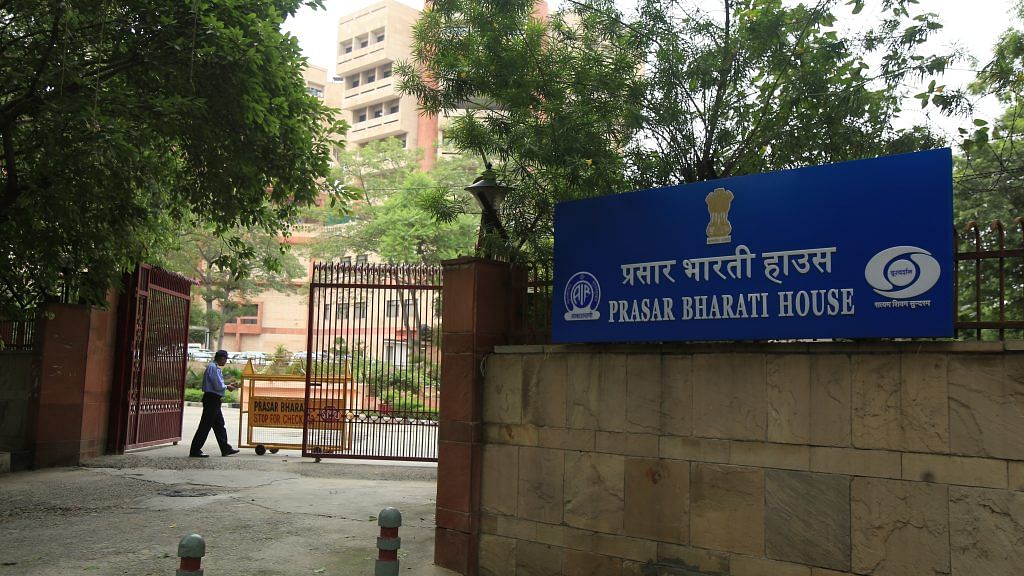New Delhi: Prasar Bharati, the parent body of state-owned broadcasters All India Radio (AIR) and Doordarshan, is on the verge of shutting down AIR’s short-wave transmitters, a move that could affect the country’s global outreach efforts in over 100 countries.
A Prasar Bharati-appointed committee, to look at rationalisation of AIR’s short-wave transmitters, has recommended the closure of 45 of the existing 48 such transmitters on the grounds that they are expensive and do not have much of an audience, sources within Prasar Bharati told ThePrint.
While many of them are used to reach a domestic audience, around 19 of these transmitters cater exclusively to global broadcasts, particularly in countries of strategic importance.
For these global AIR broadcasts, Prasar Bharati spends around Rs 60 crore annually. They include news bulletins and other programmes in 28 languages, including Balochi, Chinese, Dari, Saraiki (spoken in Southern Pakistan Punjab), Burmese, Arabic and Swahili, among others.
They reach about 108 countries including immediate neighbours Pakistan, China and Myanmar, and other countries such as Indonesia, Germany, France, Ethiopia and Nigeria.
Shutting down these transmitters will affect these external broadcasts, which are at times used as a public diplomacy tool to counter misinformation and anti-India narratives in countries with which New Delhi usually has frosty ties.
For instance, AIR’s Urdu service is popular in Pakistan. It broadcasts programmes such as Aaj Ki Baat, Fikr-o-Khayal and Manzar Pas Manzar among others.
Aaj Ki Baat features discussions on topical issues, Fikr-o-Khayal touches on issues such as internal conflicts and dissent within Pakistan while Manzar pas Manzar analyses and counters Pakistani media reports and also highlights global media reports on Pakistan.
Also read: Prasar Bharati to shut down All India Radio’s national channel, five regional academies
Will not affect global outreach: Prasar Bharati CEO
Prasar Bharati CEO Shashi Shekhar Vempati, however, told ThePrint that global outreach remains a priority for the public service broadcaster and that short-wave transmission is only one part of it.
“When it comes to global outreach, digital is the way forward. We are working to revamp our apps such as AIR World Service and news on AIR,” he said. “We are also revamping DD India with a focus on international content to put forth India’s perspective to a global audience.”
Grants from the I&B ministry would be utilised for this purpose, he said.
“In terms of global opinion making, short-wave transmissions hardly have any impact anymore,” Vempati added. “While we are not phasing them out completely, the focus of external broadcasts will now shift to digital from short waves.”
Asked if digital will have the same reach as short-wave transmitters, Vempati said that while he doesn’t doubt the reach of the short-wave transmitters and their strategic importance, most of India’s short-wave transmitters are now defunct.
“There is no record on their listenership too. Instead, the FM transmitters network will be further strengthened at sensitive borders and also more medium wave transmitters will be installed,” he said. “We are also exploring hiring airwaves of other countries for a specific time duration for our broadcasts.”
MEA had opposed the move
While the discussions on doing away with short-wave transmitters have been on for some time now, the then Ministry of External Affairs (MEA) spokesperson Vikas Swarup had strongly objected to the idea of closing them down in 2016.
In a letter to the Information and Broadcasting ministry, Swarup had said that the MEA was concerned about reports of short-wave transmitters being shut down, stating that the most important tool of public diplomacy is airwaves as opposed to social media and other mediums. He further wrote that feedback from Indian missions abroad indicated that countries successful in their outreach had relied on traditional short-wave radio broadcasts.
In his letter, Swarup cited the example of Voice of America, BBC World Service, Deutsche Welle and Chinese Radio International as those that have successfully achieved a large global footprint while broadcasting on short wave.
Retired diplomat Gurjit Singh, who was the former envoy to Indonesia and Germany, said if the AIR is not flush with funds, it needed to focus on newer technologies and focus its short-wave transmissions in areas where other modes of communication are infrequent and for countries that are not friendly to India.
Reiterating that radio is an important tool of public diplomacy, Singh said, “A cost-benefit analysis has to be done and at the same time it needs to be seen how many people AIR is reaching with its current short-wave transmissions.”
Also read: A social media ad policy, censor overhaul: What’s on the cards as Javadekar returns to I&B
‘Short-wave best for long-distance broadcasts’
A number of officials who are experts in broadcast engineering in AIR and DD told ThePrint that for any long-distance broadcast, there cannot be a better alternative to short-wave transmitters.
“Radio signals from short-wave transmitters not only have greater reach, particularly to areas of strategic interest to India where internet penetration is low but are also relatively difficult to jam, unlike Internet-based radio services,” said one of the officials.
With many of India’s short-wave transmitters being old and worn out, however, there has been a search within Prasar Bharati for newer technology with the same kind of qualities as the short-wave transmitters to replace them.
Former I&B ministry officials who have handled this subject in their earlier stints say international broadcasters take a mixed approach when it comes to short-wave transmitters. “With the kind of reach short-wave transmitters have, even in the remote locations transcending hills and deserts, it is not at all a good idea to close most of our short-wave transmitters,” a senior official who had served in the ministry said.
“Moreover countries with whom India doesn’t have a cordial relation, will not let allow transmitters such as FM. Short-wave transmitters are the only option in such cases,” the official added.
Also read: Modi govt’s I&B to-do list — regulating platforms like NaMo TV, Netflix & online news
